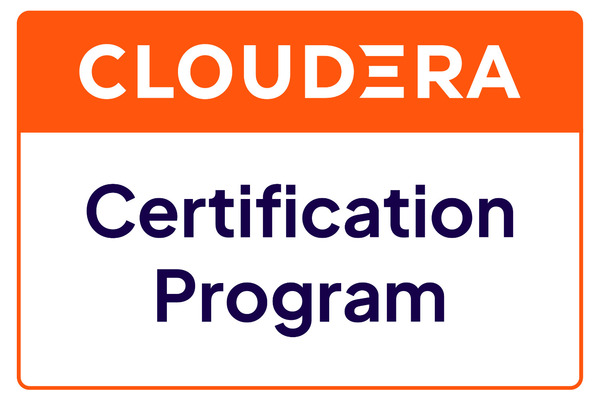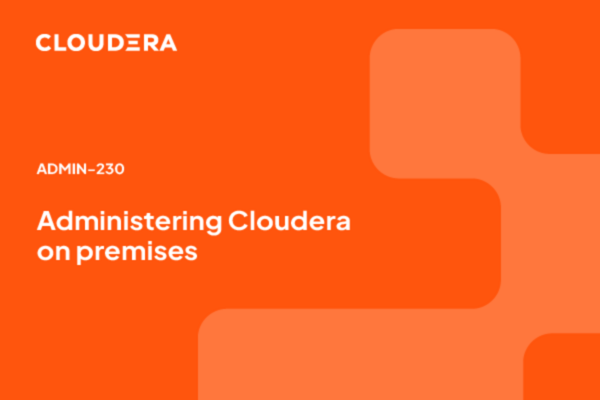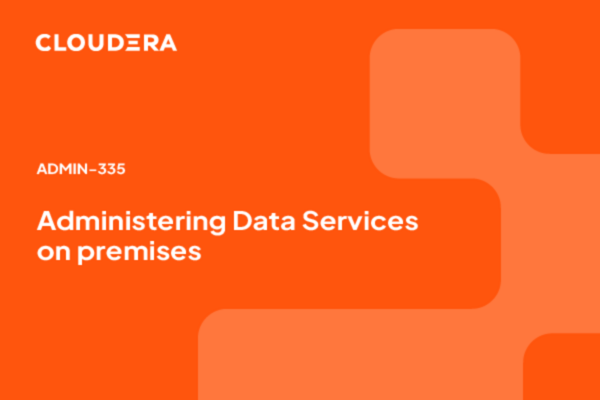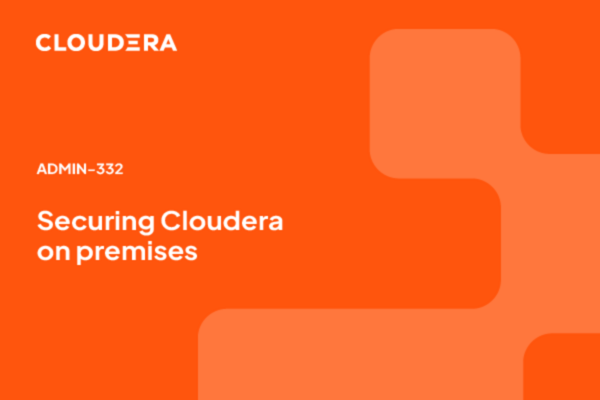Upcoming Sessions
-
February
2
ILT - DOPS-242: Ingesting with Cloudera DataFlow and Apache NiFi - 4791752
Starting:2026/02/02 @ 09:00 AM RiyadhEnding:2026/02/05 @ 05:00 PM Riyadh -
February
2
ILT - DANA-262: Analyzing with Cloudera Data Warehouse - 4833758
Starting:2026/02/02 @ 09:00 AM CairoEnding:2026/02/05 @ 05:00 PM Cairo
See All Upcoming Sessions

DO NOT START THIS CERTIFICATION EXAM HERE! Once you have been enrolled, you will receive an email with additional instructions to schedule your exam. If you click through this course and complete it you will not receive the email. Read more

Cloudera is a fully integrated edge to AI product set. Cloudera Manager is purposely built as the DevOps tooling for building and managing the Cloudera platform. This four-day hands-on course presents detailed explanation, comprehensive theory, key skills, and recommended practices for successful platform administration. Upon completion of this course a Cloudera Administrator will learn the full range of functionality and capability of Cloudera Manager. DATE: March 3-6, 2026 9:00 - 17:00 (Beijing TIMEZONE) Virtual Classroom, APAC - Chinese Read more

This four-day course teaches the architecture, deployment, and configuration of Cloudera Data Services on Embedded Containerized Services (ECS). Cloudera Data Services provide a state-of-the-art, low- code platform that unifies the entire data lifecycle, reducing development costs and accelerating the development and deployment of use cases. The course starts by covering best practices for managing Docker images and containers. Students will then build a Docker private registry. This Docker private registry will be used to deploy a Data Services cluster on ECS. Students will install, configure, and validate Cloudera Data Engineering, Cloudera Data Warehouse, and Cloudera Machine Learning. Through hands-on exercises, students will gain experience with Kubernetes, install a Private Cloud Embedded Container Service (ECS), and deploy Cloudera Data Services. Additionally, the course covers networking and hardware requirements and explains how Kubernetes pods dynamically scale to support Cloudera Data Services. Who should take this course This immersive course is designed for Cloudera Administrators transitioning to managing Cloudera Data Services on premises. Students should have at least 3 to 5 years of system administration experience. Students must have proficiency in the Linux Command Line Interface and knowledge of Identity Management, including Transport Layer Security and Kerberos. Familiarity with SQL select statements is recommended. Prior experience with Cloudera products is required. Students need reliable internet access to connect to the Amazon Web Services environment used in this course. Recommended prerequisite courses • ADMIN-230: Administering Cloudera on premises • ADMIN-332: Securing Cloudera on premises DATE: March 31-April 3, 2026 9:30 - 17:30 (SGT TIMEZONE) Virtual Classroom, APAC Read more

This four-day course teaches the architecture, deployment, and configuration of Cloudera Data Services on Embedded Containerized Services (ECS). Cloudera Data Services provide a state-of-the-art, low- code platform that unifies the entire data lifecycle, reducing development costs and accelerating the development and deployment of use cases. The course starts by covering best practices for managing Docker images and containers. Students will then build a Docker private registry. This Docker private registry will be used to deploy a Data Services cluster on ECS. Students will install, configure, and validate Cloudera Data Engineering, Cloudera Data Warehouse, and Cloudera Machine Learning. Through hands-on exercises, students will gain experience with Kubernetes, install a Private Cloud Embedded Container Service (ECS), and deploy Cloudera Data Services. Additionally, the course covers networking and hardware requirements and explains how Kubernetes pods dynamically scale to support Cloudera Data Services. Who should take this course This immersive course is designed for Cloudera Administrators transitioning to managing Cloudera Data Services on premises. Students should have at least 3 to 5 years of system administration experience. Students must have proficiency in the Linux Command Line Interface and knowledge of Identity Management, including Transport Layer Security and Kerberos. Familiarity with SQL select statements is recommended. Prior experience with Cloudera products is required. Students need reliable internet access to connect to the Amazon Web Services environment used in this course. Recommended prerequisite courses • ADMIN-230: Administering Cloudera on premises • ADMIN-332: Securing Cloudera on premises DATE: March 10-13, 2026 9:30 - 17:30 (SGT TIMEZONE) Virtual Classroom, APAC Read more

Cloudera is a fully integrated edge to AI product set. Cloudera Manager is purposely built as the DevOps tooling for building and managing the Cloudera platform. This four-day hands-on course presents detailed explanation, comprehensive theory, key skills, and recommended practices for successful platform administration. Upon completion of this course a Cloudera Administrator will learn the full range of functionality and capability of Cloudera Manager. DATE: April 13-16, 2026 Virtual Classroom, EMEA 9:00 - 17:00 (CEST TIMEZONE) Read more

Overview The Cloudera platform is intended to meet the most demanding technical audit standards. The significant improvements in Cloudera architecture and components make Cloudera “Secure by Design.” This four-day hands-on course is presented as a project plan for Cloudera administrators to build fully secured Cloudera clusters. The course begins with implementing Perimeter Security by installing host level security and Kerberos. Next, students protect Data by implementing Transport Layer Security using Auto-TLS and data encryption using Key Management System and Key Trustee Server (KMS/KTS). Following this, in the third stage, students control access for users and to data using Apache Ranger and Apache Atlas. The fourth stage focuses on visibility practices, teaching students how to audit systems, users, and data usage. Finally, the course introduces Cloudera practices for Risk Management in a fully secured Cloudera platform. This course is 60% exercise and 40% lecture. Who should take this course? This immersion course is designed for Linux Administrators transitioning to Cloudera Administrator roles. Students must have proficiency in Linux (e.g., navigating the file system, using basic commands) and Linux text editors (e.g., vi, nano). Familiarity with Directory Services, Transport Layer Security, Kerberos, and SQL select statements is recommended. Prior experience with Cloudera products is required. Students must have reliable internet access to connect to the classroom environments hosted on Amazon Web Services. DATE: April 20 - 23, 2026 9:00 - 17:00 (GMT+2 TIMEZONE) Virtual Classroom, EMEA Read more
Shopping Cart
Your cart is empty
